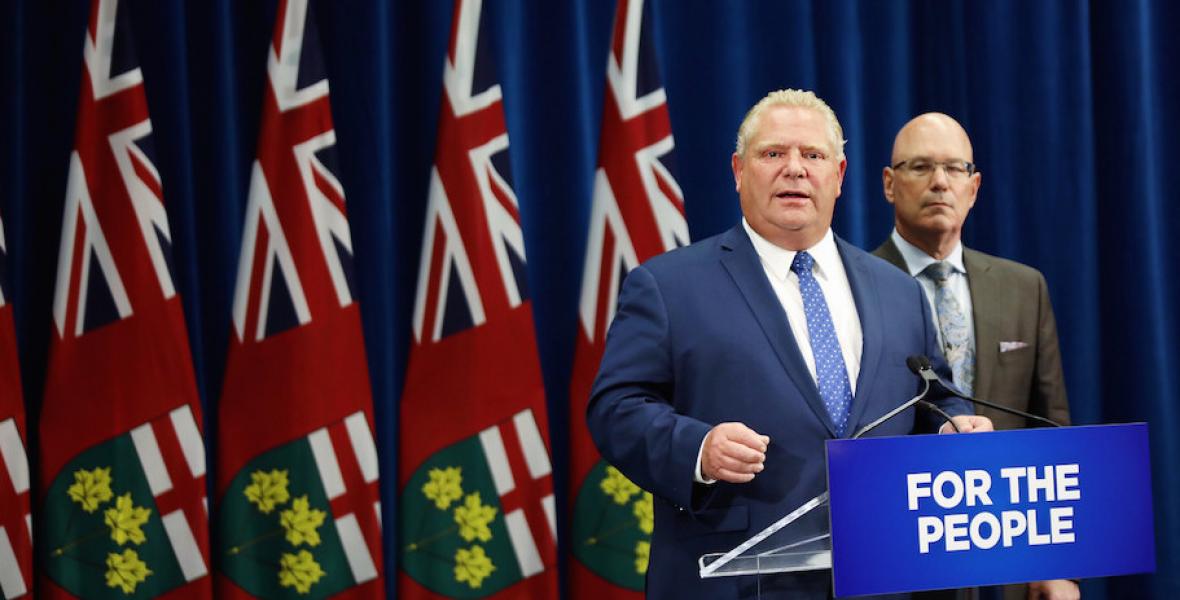On November 13, Ontario’s Environmental Commissioner issued a scorching report warning that while Ontario has “some of the most abundant fresh water in the world,” it is polluting much of it.
The province has done much to make sure drinking water is safe in the wake of the “Walkerton water tragedy” of the 1990s, the report says. However, “nothing comparable has been done to protect the rest of Ontario’s lakes and rivers, many of which are being seriously harmed by pollution.”
Two days later, Ontario’s provincial government under Doug Ford abolished the office of the Environmental Commissioner. It said it was a cost-cutting measure; but as with other similar measures, including the abolition of the child advocate and the commissioner for French-language services, the government could not say how much money it might actually save.
Here, Ford is clearly borrowing from the playbooks of former prime minister Stephen Harper and U.S. President Donald Trump. For Ford, as for Harper and Trump, abolishing independent agencies has little, if anything, to do with saving money. The Ontario Conservative government’s real purpose is to silence independent voices that are not 100-per-cent onside with its agenda.
The Harper government killed the court challenges program, which created something of an even playing field for people and groups who lacked major financial resources but wished to challenge legislation on the basis of the Charter of Rights and Freedoms. Well-financed corporate interests, notably the tobacco industry, have always had lots of cash to take the government to court. Big tobacco showed as much when it challenged federal plain-packaging legislation on the basis of the Charter’s free speech provisions.
Harper also severely curtailed the public communications and investigative powers of the Chief Electoral Officer, silenced government scientists working on climate change and attacked the charitable status of independent groups that disagreed with his agenda.
As for Ford, he is just getting started. He only took power this past summer.
When Harper and Trump went after scientists and officials whose findings they did not like, they also made their work disappear from public view. Years of research and recommendations simply vanished from the internet.
In case the Ford government tries the same trick, here is where you can still find the most recent full report from the Environmental Commissioner, entitled “Back to Basics.”
Combined runoff of sewage and rainwater is toxic and dangerous
The Environmental Commissioner’s attention to evidence and fact demonstrates why such independent agencies are essential to the formation of sound public policy.
On the water issue, the report goes into considerable detail on local efforts to protect the Ontario watersheds that are the sources of drinking water from contaminants, which range from septic systems to road salt and agricultural run-off. It notes where communities have taken adequate steps and where there is room for improvement. In the latter category, the report recommends more stringent measures to deal with potential contamination from home heating oil tanks. They are an example of a pollution source that falls between bureaucratic chairs.
As for all of the many thousands of Ontario lakes, streams and rivers that do not directly supply drinking water, the Environmental Commissioner reports that a “sea of pollutants” is harming them.
Sewage, industrial waste, run-off from farms, and spill-over of road waste are “threatening many provincial aquatic ecosystems, impairing Ontarians’ ability to swim and fish, and harming economic activities that rely on clean water.”
The report notes that Ontario’s new Conservative government has identified “protecting and preserving our waterways” as one of its priorities. The commissioner then adds: “They have a lot of work to do.”
On sewage, for instance, the report tells us that although Ontario municipalities treat about 90 per of the province’s sewage, raw and partially treated sewage still flows into lakes and rivers from many local sewage systems.
The report identifies the villain here as being what it calls “combined sewage outflows.” These outflow systems carry both sewage from toilets and drains and stormwater from rain and snow melt. They are highly toxic, and regularly force authorities to close beaches while making recreational use of rivers, streams and lakes dangerous.
Ontario actually outlawed combined outflow systems in 1985, but 44 municipalities – including the two biggest – Toronto and Ottawa – still use them. The big danger of this system comes when there is heavy rainfall, which can bring on uncontrollable excess flows of pollutants, which “carry toxic pathogens into Ontario’s waterways.”
The commissioner’s report points out that the public does not normally find out about these noxious overflows except when health officials close beaches; and it outlines a long list of recommendations to stop these polluting overflows.
Municipalities can use storage tanks to hold mixed sewage until their plants are able to treat them. They can optimize treatment plant operations to “better manage increased mixed sewage flow” after big rainstorms. And they can use green infrastructure to reduce surface runoff toward streams and rivers.
The report also recommends that the Ontario environment ministry get much tougher with municipalities that fail to act to curtail these dangerous overflows.
“Why,” the report asks, “does the ministry never prosecute municipalities for these overflows?”
The Environmental Commissioner points out that municipalities can legally get a break from their full responsibilities on this score only if they demonstrate they have done due diligence. That is, they have taken “all reasonable steps” to avoid combined sewage overflow.
The 2018 Ontario Environment Commissioner’s recommendations on overflows, and on many other significant issues, are thorough, practical, detailed and well-considered. Instead of reacting to them by promising to take action, the Ford government decided to shoot the messenger and kill the commission.
Photo: Premier of Ontario Photography/Flickr
Karl Nerenberg has been a journalist and filmmaker for more than 25 years. He is rabble’s politics reporter.
Help make rabble sustainable. Please consider supporting our work with a monthly donation. Support rabble.ca today for as little as $1 per month!




